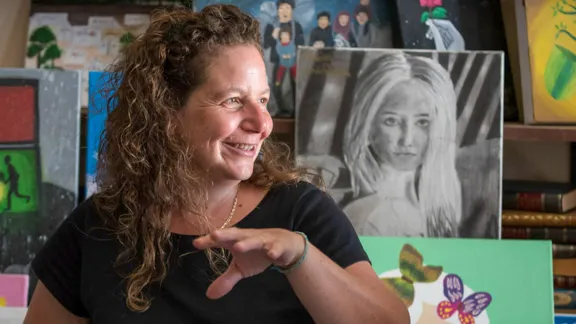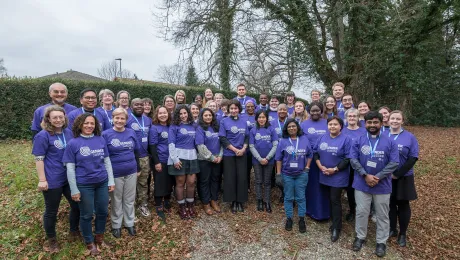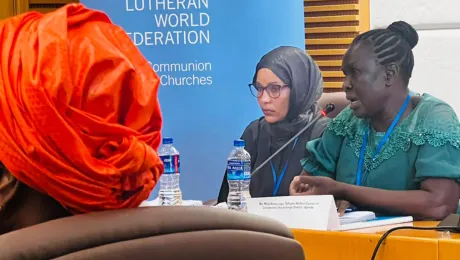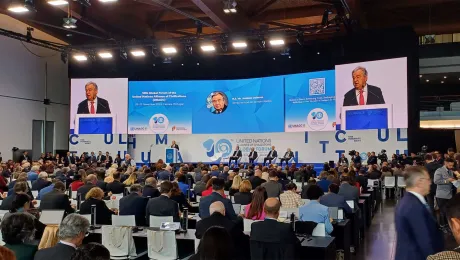A British couple living on the Greek island of Lesbos found themselves caught up in the refugee crisis of 2015 as thousands sought shelter and asylum in Europe. Listen to their story in the second episode of the ‘Living as Neighbours’ podcast

Philippa Kempson, co-founder of The Hope Project on Lesbos. Photo: The Hope Project
Living as Neighbours: Philippa Kempson, co-founder of The Hope Project
(LWI) - Philippa Kempson and her husband Eric moved from Britain to the Greek island of Lesbos with their young daughter in the spring of 2000. He was a painter and sculptor, while she had a background in social work and business management. They came in search of a quiet life, but it didn’t work out the way they had planned.
Today, they run The Hope Project, a beacon of support for refugees and migrants who have been arriving on the island in their tens of thousands over the past decade. From the provision of water, food and a few blankets in the early days, their work now includes a distribution warehouse, an arts and crafts center, a barber, a beauty salon, a tailor’s shop and a female-only gym.
Philippa’s tells their story in episode two of the ‘Living as Neighbours’ podcast, launched this month by the Lutheran World Federation and ‘A World of Neighbours’ network.
I don’t understand how you can drive past and not do anything.
– Philippa Kempson, co-founder of The Hope Project on Lesbos
When they first arrived in Lesbos, Philippa found work as a waitress in bars or restaurants and later they set up a small shop selling Eric’s artworks. But in 2014, from their idyllic location near Eftalou beach, known for its healing thermal springs, the couple began to see small boats leaving the coast of Turkey, only six kilometers away. “It looks deceptively close, but the Aegean [sea] is known for its fierce currents and dramatically changing weather,” Philippa says. “At that point though, it was mostly young men, arriving at night, so all we saw was debris they left on the beach.”
Then in December, as she was driving their daughter to school in the early morning, she saw a boat landing on the beach and people scrambling to the shore, including a small girl with a bright red coat. “That was a turning point,” she recalls. “How can I take my child to school and see kids freezing on the beach? I don’t understand how you can drive past and not do anything.” They stopped to see what they could do, returning shortly afterwards with water, fruit, towels and blankets from their own home.
In 2015, as the war in Syria intensified, the situation on Lesbos deteriorated rapidly, Philippa says, “from a few boats a week, to a few boats a day, to the height of the crisis in October, when 12,000 people arrived in one day.” But no help came for the refugees, many of whom had injuries or suffered from hypothermia, sometimes dying on the beach after surviving the perilous journeys. Many others died as their flimsy boats sank or overturned in the sudden storms. For many years, Philippa was unable to swim in the sea, traumatized by so many tragedies that she saw, month after month.
Dignity, hope and sense of self-esteem
“For people on the first boats,” she continues, “we brought little, we had little to give.” As they told others about the plight of the refugees, she remembers that tourists gave money or clothes, locals left donations at the pharmacy for her to buy bandages and supermarkets started providing day-old bread or other food items. “Often, we just showed up with a hug, a smile, a welcome, a handshake,” Philippa says. “A reassurance was really more valuable than food.”
But as time wore on, she realized there was an urgent need for a place where survivors of such traumatic journeys could find peace and a renewed sense of dignity. With refugees themselves working as volunteers, she and Eric started The Hope Project in Moria in 2017 to provide that safe oasis for new arrivals to the island. The center began offering art classes, music, dance, yoga, alongside clean clothes, sanitary products and other basic items for adults and children.
A beauty salon, a barber and a tailor’s shop were added to help restore dignity and self-esteem to people who lost everything as they fled from their war-torn homelands. “We’re not psychologists, but if people have a sense of purpose and can see themselves, not as refugees, but as artists, musicians, tailors or cooks, that’s a big step for mental health,” Philippa says.
The emotional toll for Philippa and her family has been huge, as she readily admits. “I’m tired of dead kids on the beach, I’m tired of abusive people,” she says. Following death threats from those who opposed the work they were doing, she made the difficult decision to send her daughter away from the island. But she insists, “it’s been an incredibly enriching experience and I have met some amazing people. We’ve tried to make this a community project, to involve everyone here, because if you can create an environment where people can meet and talk, it becomes very different experience.”
The Living as Neighbours podcast is a joint initiative of the Lutheran World Federation and A World of Neighbours network, which supports people helping migrants and refugees across the European continent. The project is supported by the German government through the Deutsche Gesellschaft für Internationale Zusammenarbeit. Each of the eight episodes features ordinary individuals doing extraordinary work to help the most vulnerable people stranded along some of Europe’s remotest borders.


